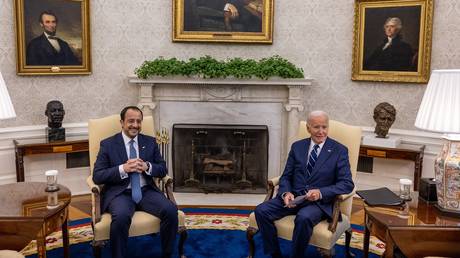ARTICLE AD BOX
IRAN could make enough fuel for six devastating nuclear bombs in just one month, an ex-UN inspector has warned.
It comes after fears over a further escalation of a global war continue to rise as Iran and Pakistan go tit-for-tat in deadly strikes.
 Pakistan have attacked Iran in retaliation strikes as the battling nations go tit-for-tat in attacks
Pakistan have attacked Iran in retaliation strikes as the battling nations go tit-for-tat in attacks People gather near rubble after a Pakistan military strike on an Iranian villageReuters
People gather near rubble after a Pakistan military strike on an Iranian villageReuters
Former UN inspector David Albright sent out a chilling warning to the rest of the world about the power Iran hold because of their ability to produce weapon-grade uranium on a mass scale.
The ex-IAEA expert said: “Iran can quickly make enough weapon-grade uranium for many nuclear weapons, something it could not do in 2003.
“Today, it would need only about a week to produce enough for its first nuclear weapon.
“It could have enough weapon-grade uranium for six weapons in one month, and after five months of producing weapon-grade uranium, it could have enough for twelve.”
Iran still hasn’t mastered the technology to “weaponise” its highly enriched uranium but if they figure it out soon they have the potential resources to create 12 nukes in just five months.
Britain’s defence secretary Grant Shapps has previously told the world that Iran has enriched uranium to a staggering 83.7 per cent.
Shapps then sent a chilling message saying this is at a level where “there is no civilian application”.
In a report for the US-based Institute for Science and International Security, Albright said Iran had mastered enrichment and missile technology.
Two of the three pillars to building a successful nuclear weapon.
The final and most crucial stage is weaponisation – something Albright claims they’re still far from solving.
This pillar of creating a nuke includes building the highly explosive nuclear trigger system.
To set off the chain of reactions that results in a nuke’s devastation a neutron initiator has to be developed that when set off creates the nuclear explosion.
He continued: “Weaponisation is the pole that needs more work.
“It involves theoretical calculations and simulations; development, testing, and construction of the other components of the nuclear weapon.
“The conversion of weapon-grade uranium into metallic components, the integration of all the components into a nuclear weapon and the preparation for mounting the weapons on aircraft or missiles or for use in a full-scale underground test.”
This worrying warning comes after at least nine people were killed after Pakistan pounded Iranian “terrorist hideouts” in a wave of revenge missile strikes.
The airstrikes on the Sistan and Baluchestan province on Thursday morning come days after an Iranian drone strike left two children dead.
Pakistan’s Foreign Ministry described their attack on Iran as a “series of highly coordinated and specifically targeted precision military strikes”.
“This morning‘s action was taken in light of credible intelligence of impending large scale terrorist activities,” the Foreign Ministry said in a statement.
“This action is a manifestation of Pakistan’s unflinching resolve to protect and defend its national security against all threats.”
Earlier this week, Iran attacked targets inside Pakistan with bomb-carrying drones and rockets.
Pakistan‘s Foreign Ministry claimed two children were killed in the “unprovoked violation” of the country’s airspace while others were injured.
Iran’s state media said its warped terrorist army the Revolutionary Guard carried out the strikes on Tuesday evening – but later withdrew the reports.
Reports said they targeted bases belonging to the militant group Jaish al-Adl, who also have a presence in Iran itself.
The group raged on Tuesday that six bomb-carrying drones and rockets struck homes belonging to the militants, their wives and children.
They claimed two children had died in the ambush and two women and a teenage girl were injured.
Chilling footage reportedly taken near the site – shared by HalVash – appeared to show a burning building and two small bodies.
Pakistan had slammed the airstrikes – and warned that Iran could face “serious consequences” following the “completely unacceptable” escalation.
China urged both countries to show “restraint” after the strikes.
These strikes are just adding to exploding tensions in the Middle East as the Israel and Hamas war rages on and Iran-backed Houthi rebels cause chaos in the Red Sea.
 EPA
EPA Getty
Getty Tensions have been flaring in the Middle East amid Houthi (pictured) attacks
Tensions have been flaring in the Middle East amid Houthi (pictured) attacks.png)
 10 months ago
7
10 months ago
7








 English (US)
English (US)